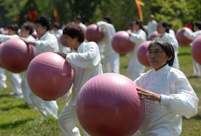 Amphibious armored vehicle unit conducts open sea drill
Amphibious armored vehicle unit conducts open sea drill
 Water relay in Henan
Water relay in Henan
 Ethnic culture feasts eyes of travelers
Ethnic culture feasts eyes of travelers
 80 security dogs assembled in Nanjing police dog training base
80 security dogs assembled in Nanjing police dog training base
 Graffiti artists paint on street walls in Xinjiang
Graffiti artists paint on street walls in Xinjiang
 Story of ceramic artist Zhang Lingyun
Story of ceramic artist Zhang Lingyun
 Magic summer night dream in Hongyuan
Magic summer night dream in Hongyuan
 Incredible creatures in headwaters drainage region of Lancang River
Incredible creatures in headwaters drainage region of Lancang River
 The future of rock n' roll seen in young rockers in China
The future of rock n' roll seen in young rockers in China
 Magnificent Yanziya Cliff
Magnificent Yanziya Cliff
SAN JOSE, Aug. 11 -- China needs to boost football's popularity at home if it wants to one day have a world-class team, according to Costa Rica's top football official.
In an interview with Xinhua, the president of the Costa Rican Football Federation, Eduardo Li, shared some of the reforms he spearheaded since heading the agency in 2007 to turn Costa Rica into a football power.
Costa Rica's national team was the underdog that surprised football fans and experts alike at the 2014 Brazil World Cup, with the result that the federation will now have to work harder to live up to the high expectations their impressive performance generated both at home and abroad, said Li.
"Thanks to the efforts of not just me, but also others, Costa Rica today has (a program called) Project Goal that makes us proud internationally," said Li, a second generation Costa Rican of Chinese ancestry.
The first step, said Li, was to change the statutes of the national federation, based on the statutes of the International Federation of Associated Football (FIFA), to prevent the president of the football body from being named or dismissed depending on whether the team wins or loses.
Other reforms included "bringing professionals into the management area, so the federation is managed like the private company that it is," said Li.
"There are no secrets" to Costa Rica's ability to advance to the quarterfinals of the World Cup, said Li, adding all you need is a well-qualified work team with a willingness to work.
The key is to recruit "valuable professionals in all areas ... the athletic area, the coaching area, the medical area, to comprise a work group, which is the important thing," said Li.
Costa Rica has also improved its minor league formations around the country, said Li, acknowledging the federation still needs to improve its talent scouting.
The Costa Rican federation receives no funding from the government, so it has the autonomy to make the decisions it deems best for football around the country, said Li, "and that's better, because political interference, with all due respect, is not recommendable in my opinion."
Ultimately, said Li, the factor that today differentiates Costa Rica from China is that Costa Ricans are "100 percent football fans" who are interested in the game, play the game nationwide and generate new talent.
"Perhaps that is what is lacking in China, popularizing football so it can have the talent it needs to reach the (world- class) level it seeks," said Li.
Spending alone is not enough, said Li, noting "larger developing countries don't have the (football) talent Costa Rica has, even though we don't have the financial resources they do."
Li said he considered his Chinese counterpart "a good friend," and was willing to organize exchange programs and cooperation in the sport to improve football in both countries.
He also acknowledged the "enormous contribution" that China's government made to Costa Rican football with its generous donation of the San Jose National Stadium, which was inaugurated in 2011.
Li, the grandson of Chinese emigrants, was born in Costa Rica's Pacific coast town of Puntarenas, and though he speaks no Chinese, has traveled to China on various occasions.
"I am very proud of my Chinese roots and of my ancestors," said Li, whose career in football began with the founding of the Puntarenas football club, which went on to become a First Division team.
 Beijing policewomen posters become a hit
Beijing policewomen posters become a hit Armored regiment trains on the sea
Armored regiment trains on the sea Children spend 'Father's Day' with dads at work
Children spend 'Father's Day' with dads at work 'Pan Da' appear in Shanghai World Financial Center
'Pan Da' appear in Shanghai World Financial Center Champions take selfies on podium
Champions take selfies on podium National Fitness Day celebrated around China
National Fitness Day celebrated around China Traditional culture colors summer vacation
Traditional culture colors summer vacation Young athletes fighting for their dreams
Young athletes fighting for their dreams 68 meters high thermometer in Shanxi, called ‘fighter’ of thermometers
68 meters high thermometer in Shanxi, called ‘fighter’ of thermometers 22-year-old veteran travels around China
22-year-old veteran travels around China
 Night scenery of pagoda forests
Night scenery of pagoda forests China suffers from hot summer
China suffers from hot summer 48 hours after super Typhoon Rammasun
48 hours after super Typhoon Rammasun German pianist plays mid-air ‘magic carpet’ show over Munich Airport
German pianist plays mid-air ‘magic carpet’ show over Munich Airport
 China's manned deep-sea submersible conducts dive in Pacific Ocean
China's manned deep-sea submersible conducts dive in Pacific Ocean
Day|Week|Month